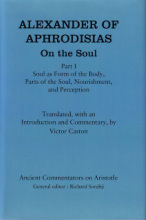
The latest volume in the series to be published is Victor Caston's translation of the first part of Alexander of Aphrodisias' On the Soul. This is the 91st volume in the series and is another step towards 100 volumes published by the end of 2012. Details at Amazon.
Description: Around 200 AD, the greatest defender and interpreter of Aristotle within his school, Alexander of Aphrodisias, composed his own book 'On the Soul', partly following the pattern of Aristotle's. In the first half, translated in Part I, he discusses the soul as the form of the body, and the idea of parts or powers that constitute the soul of living things, including the two lowest powers: nutrition and perception. In the second half, to be translated in Part II, he discusses perception, representation, desire, understanding and - a Stoic term - the governing part of the soul. He takes the soul to consist of these powers, which supervene on the mixture of the body's elemental ingredients, just as inanimate powers like buoyancy or lightness can supervene on other qualities. The supervening powers are newly emergent and the soul's powers do not belong to the constituent ingredients of the body. Through his notion of supervenience, he seeks to steer between the Platonic dualism of soul and body and the materialism of his Stoic rivals.
Description: Around 200 AD, the greatest defender and interpreter of Aristotle within his school, Alexander of Aphrodisias, composed his own book 'On the Soul', partly following the pattern of Aristotle's. In the first half, translated in Part I, he discusses the soul as the form of the body, and the idea of parts or powers that constitute the soul of living things, including the two lowest powers: nutrition and perception. In the second half, to be translated in Part II, he discusses perception, representation, desire, understanding and - a Stoic term - the governing part of the soul. He takes the soul to consist of these powers, which supervene on the mixture of the body's elemental ingredients, just as inanimate powers like buoyancy or lightness can supervene on other qualities. The supervening powers are newly emergent and the soul's powers do not belong to the constituent ingredients of the body. Through his notion of supervenience, he seeks to steer between the Platonic dualism of soul and body and the materialism of his Stoic rivals.
 RSS Feed
RSS Feed
